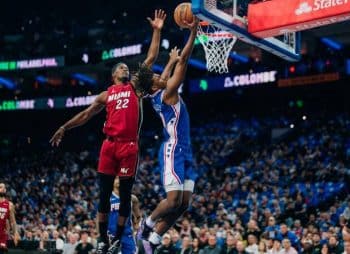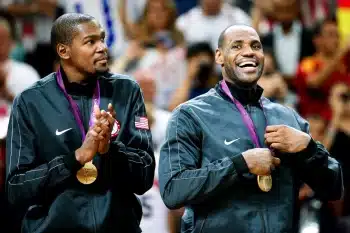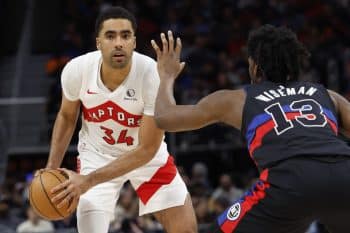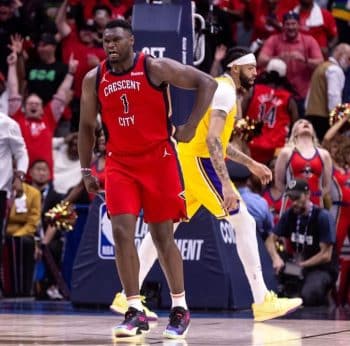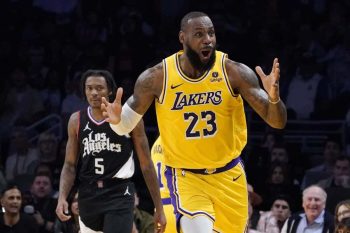NBA
NBA Sunday: Pay Attention to the Hornets

At some point, you’ve just got to sit back in awe and wonder when a player is going to get his due.
Yes, the Golden State Warriors and their pursuit of the single-season record for most wins is a major story, as are the San Antonio Spurs and their overall dominance of the league. And where Kevin Durant will be continuing his career next season is also a major question worth our attention.
But, at some point, one has to stop and look a little closer and give credit where credit is due, and in this instance, we do just that.
Very quietly, the Charlotte Hornets have gone 15-3 over their past 18 games and have solidified themselves as a quality team in the Eastern Conference while Kemba Walker has quietly proven to everyone in the world that he belongs.
* * * * * *
As the torchbearer for New York City point guards, Walker and I have known each other since he entered the league back in 2011. The last time we sat down and had a full-length one-on-one conversation was in January 2015. Walker was still trying to figure out a few things in Charlotte and would eventually see his team fall short in its pursuit of the playoffs. Injuries and chemistry issues were mostly to blame and a team that many had tabbed as being on the rise in the Eastern Conference turned in a disappointing campaign to the point where there were many that believed that head coach Steve Clifford would be shown the door.
Since then, general manager Rich Cho and his staff have done a masterful job of filling out a competitive roster while Walker has blossomed into one of the league’s more underrated and under-discussed point guards.
Ridding themselves of Lance Stephenson and acquiring Nicolas Batum was a move that could only be described as a stroke of genius. Batum has been highly regarded amongst NBA general managers and scouts for years. It was only a few years ago that the Minnesota Timberwolves extended him a four-year, $46 million offer sheet that the Portland Trail Blazers (his incumbent team at the time) eventually agreed to match. That was significant because in the months prior, the Blazers attempted to re-sign Batum to an extension that averaged about $5 million per year. At the time, he was regarded as a role player whose contributions were easily replaceable, but obviously, that is something the Blazers thought better of.
With the departure of LaMarcus Aldridge, the Blazers opted to completely pull the plug on the prior generation of contributors and begin anew. Batum was caught up in that and ended up being dealt to Charlotte for what many believed was a few cents on the dollar, as Gerald Henderson and Noah Vonleh still have a ways to go before they reach Batum’s impact level.
Entering play on March 13, Batum is having what could be considered a career-best year: 14.5 points, 6.3 rebounds and 5.6 assists per game. He is also renowned as a true two-way player and has consistently shown the ability to keep the ball moving and create open shots from the forward position.
As the league has fallen into the habit of switching on 1-4 and 1-5 pick and rolls, most successful teams need to have a front court player who can receive a pass from the point guard at the top of the key or at the free-throw line extended area and get the ball into the paint. Like Boris Diaw and Draymond Green, Batum has this ability and he has paid major dividends in Charlotte, even through just 56 games.
* * * * * *
From Frank Kaminsky, Courtney Lee and Jeremy Lin to Jeremy Lamb, the new faces and new acquisitions in Charlotte have seemed to mostly work out. Still it is with the coaching of Clifford, the return of Al Jefferson and the toiling of Walker that the Hornets appear to have an opportunity to advance out of the first round of the playoffs for the first time since 2002.
Without question, we are living in the golden age of the point guard. Almost every team in the NBA either has a good point guard or has one who has the potential to become a very good point guard, and the few that don’t are at a severe disadvantage.
How long would it take a reasonable person to utter the name “Kemba Walker” if and when they were asked to name some of the top flight point guards in the league today?
Surely, he wouldn’t be named amongst the tier-one lead guards such as Russell Westbrook, Chris Paul or Stephen Curry. But in the second tier—where you would probably find the likes of John Wall, Kyle Lowry, Damian Lillard, Rajon Rondo and Mike Conley—he might not be mentioned, either.
In fact, he might not be mentioned, at all, but he’s working hard to change that.
When Walker and I sat down just over a year ago, we spoke about his personal journey from the Sack-Wern housing projects in the Soundview section of New York City’s Bronx borough. Walker recalled routinely being told that he was too small or too weak to make it in the NBA. He recalls many NBA onlookers questioning the wisdom behind the Hornets signing him to a four-year, $48 million extension. According to Walker, that contract extension wasn’t the end of some journey to where the objective was to secure a payday, it was the beginning of him proving himself to be a valuable contributor on the NBA level and rewarding Michael Jordan, Steve Clifford and everyone else in the Hornets organization for having faith in him.
At this point, it’s difficult to say he’s disappointed. With a capable supporting cast and the newly acquired Nicolas Batum, since the All-Star break, Walker is averaging 25.3 points, 4.5 rebounds and 6.3 assists per game. He is shooting 49.5 percent from the field and 43 percent from three-point territory. The Hornets are 10-2 since then and have proven that they are far from an easy win on anyone’s schedule. Even with Al Jefferson still somewhat limited by the knee injury that cost him 34 games this season, the Hornets have become one of the top teams in the Eastern Conference, despite the fact that nobody is talking about them.
In the end, for Walker, it’s more of the same. At one point, he was nothing more than an undersized point guard struggling to make a name for himself in New York City. He learned that not even success on the collegiate level could turn the naysayers into believers and is now realizing that even success at the NBA level can easily go overlooked.
No, Walker may not be a superstar, but he is one of the finer and more versatile point guards in the NBA today. The impact he has on games, despite his lack of size, is worth applause. As he continues on through his journey without the accolades or the All-Star appearances, the slights are what drives him.
And after witnessing his ascent to this point, one can only wonder where—and how far from here—the journey will end.
